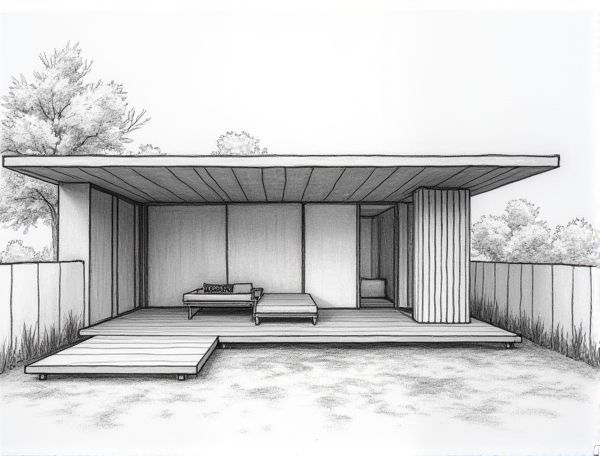
Photo illustration: Minimalist home design with shoji screen partitions
Minimalist home design with shoji screen partitions creates a serene and airy space by blending traditional Japanese aesthetics with modern simplicity. Discover how incorporating these elegant screens can enhance natural light and privacy in your home--read more in the article.
Introduction to Minimalist Home Design
Minimalist home design emphasizes simplicity, clean lines, and functional spaces, creating an uncluttered and serene living environment. By using a neutral color palette and reducing unnecessary decor, this style enhances natural light and maximizes open space, promoting calmness and clarity. Your minimalist home will foster mindfulness and efficiency, making every element purposeful and aesthetically pleasing.
The Influence of Japanese Aesthetics
Japanese aesthetics shape home design through principles like wabi-sabi, emphasizing simplicity, natural materials, and imperfection to create serene living spaces. Your interior can benefit from shoji screens, tatami mats, and minimalist layouts that promote harmony and mindfulness. Incorporating these elements enhances tranquility and fosters a deep connection to nature within your home.
What Are Shoji Screens?
Shoji screens are traditional Japanese sliding panels made from a wooden frame and translucent washi paper, designed to diffuse light softly while maintaining privacy. Commonly used in interior architecture, these screens create flexible partitions and contribute to a minimalist aesthetic by allowing natural light to flow through spaces. Their lightweight structure and elegant grid pattern make them a popular choice in modern home design for adding both function and cultural appeal.
Benefits of Shoji Screen Partitions
Shoji screen partitions enhance your living space by offering flexible room division while allowing natural light to filter through the translucent rice paper panels. These traditional Japanese screens provide privacy without sacrificing openness, creating calm and airy environments that promote relaxation. Their lightweight construction and minimalist design contribute to easy installation and a timeless aesthetic that complements various interior styles.
Integrating Shoji Screens in Modern Interiors
Shoji screens offer a timeless blend of traditional Japanese aesthetics and modern functionality, enhancing natural light diffusion while creating flexible space dividers. Your interior can benefit from the lightweight, translucent qualities of these screens, which introduce an elegant texture without overwhelming contemporary decor. Incorporating Shoji screens helps balance privacy and openness, making them ideal for minimalist and open-concept home designs.
Space Optimization with Shoji Partitions
Shoji partitions enhance space optimization by providing flexible room division while allowing natural light to flow through translucent panels, creating an open and airy atmosphere in compact living areas. Their sliding mechanism eliminates the need for door clearance, maximizing usable floor space and promoting efficient interior layouts.
Materials and Styles for Shoji Screens
Shoji screens are traditionally crafted using lightweight wooden frames paired with translucent washi paper, allowing soft natural light to diffuse through while maintaining privacy in your home. Contemporary designs sometimes incorporate modern materials like acrylic panels and metal frames to enhance durability and style, offering a seamless blend of traditional Japanese aesthetics with modern interior trends.
Lighting and Ambiance in Minimalist Spaces
In minimalist spaces, strategically placed LED lighting enhances clean lines and open layouts, creating a harmonious balance between natural and artificial light to emphasize simplicity. Soft, diffused illumination paired with neutral color temperatures cultivates a calming ambiance while highlighting key architectural features without overwhelming the space.
Maintenance and Durability of Shoji Screens
Shoji screens, crafted from lightweight wooden frames and translucent rice paper, require regular care to maintain their structural integrity and aesthetic appeal. Proper maintenance involves gentle cleaning with a soft cloth and periodic replacement of paper panels to enhance durability, ensuring these traditional Japanese room dividers remain functional and visually pleasing over time.
Shoji Screens for Every Room: Creative Ideas
Shoji screens bring elegant Japanese-inspired design to your home, creating versatile partitions that enhance light flow and privacy in any room. Incorporate these translucent panels as sliding doors, room dividers, or window treatments to seamlessly blend functionality with minimalist aesthetic.
 homedesy.com
homedesy.com